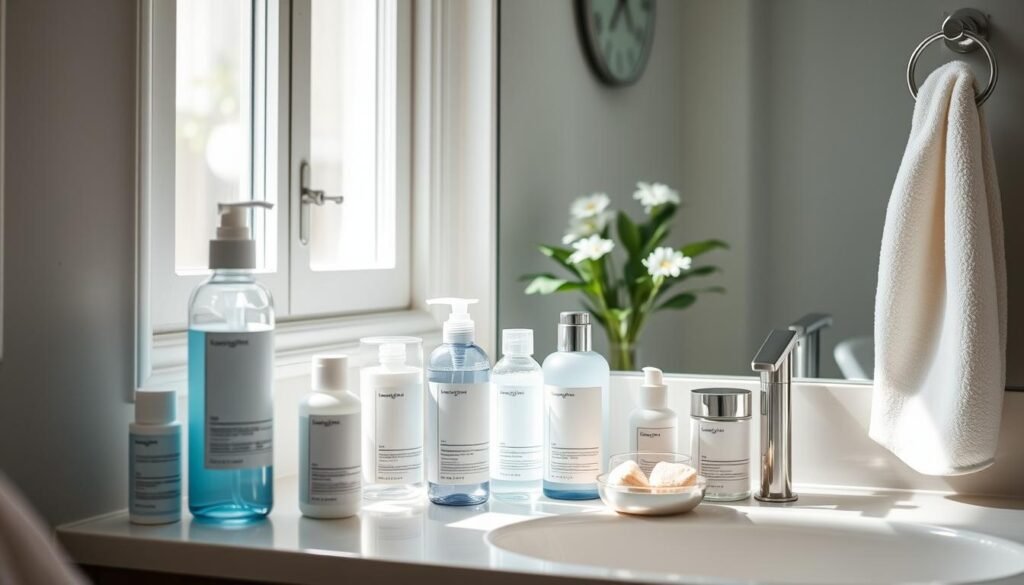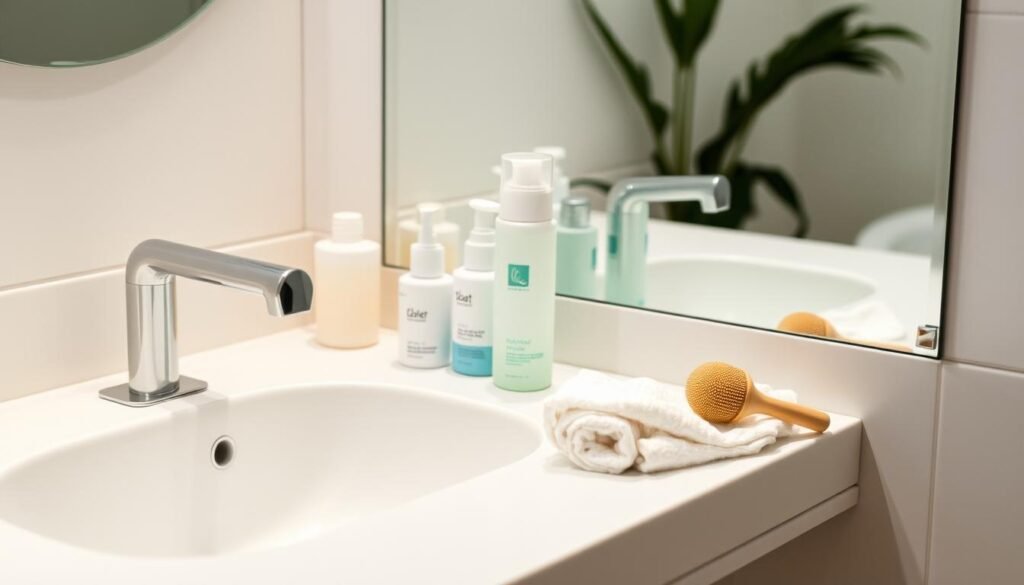About 85% of young adults battle with acne. This skin problem can really affect how we feel about ourselves. But, there’s good news. Clear skin might be more about keeping clean than we think. With the right skin care tips and routines, you can fight off breakouts. This article will show you how important cleanliness is for preventing acne. We’ll give you tips that can make a real difference.
Key Takeaways
- Understanding the role of hygiene is essential for effective acne prevention.
- Daily skincare routines significantly contribute to clearer skin.
- Choosing the right products is pivotal in a successful skincare regimen.
- Consistency in cleaning and treating the skin is key to mitigating breakouts.
- Incorporating professional advice may elevate personal skincare efforts.
- Skin protection strategies are vital for overall skin health.
Understanding Acne and Its Causes
Acne is a common skin issue that many people face. It comes from several factors. The main causes of acne are too much oil, blocked hair follicles, and bacteria growth. Hormonal changes can also play a big part, leading to more breakouts and problems for the skin.
Taking care of your skin is key. Not doing so can make things worse. Knowing what triggers your acne, like stress, certain foods, or bad skincare products, helps a lot. This knowledge lets people choose better for their skin care.
Learning about what causes acne helps people deal with the root problems. It’s important to know your skin type and how it responds to different things for effective acne management.
| Factor | Description | Impact on Skin Health |
|---|---|---|
| Excess Oil | Overproduction of sebum from sebaceous glands. | Clogs pores, leading to breakouts. |
| Clogged Follicles | Dead skin cells mix with oil, blocking pores. | Encourages bacterial growth, resulting in inflammation. |
| Bacteria | Propionibacterium acnes thrives in clogged pores. | Causes redness and pus-filled bumps. |
| Hormonal Changes | Fluctuations during puberty, menstruation, or pregnancy. | Triggers oil production and skin changes. |
| Diet | High glycemic foods and dairy may aggravate acne. | Potentially impacts sebum production and inflammation. |
| Stress | Releases cortisol, which can increase oil production. | Makes skin more prone to breakouts. |
What is Proper Hygiene for Acne Prevention?
Good hygiene is key in fighting acne. It’s vital to develop a daily skincare routine for better skin health. This helps a lot in preventing acne. Start by washing your face regularly with a soft cleanser. This cleanser shouldn’t remove the skin’s natural oils. This step removes dirt, oil, and other things that can block pores.
It’s important to use products that don’t block pores. Choosing the right skincare products helps you take care of your skin better. This way, you can manage acne more easily. It’s also essential to keep your hands clean before touching your face. This simple habit helps prevent acne.
For more tips, check out self-care instructions for acne. These tips stress how important good hygiene is. Developing a complete skincare approach can make your skin clearer.
By following a steady routine, your skin can become clearer and healthier. Adopting these practices is the foundation for lasting acne prevention and skin wellness.

Acne Prevention Through Proper Hygiene
Clear skin starts with understanding how important hygiene is. Keeping your skin clean is the base of good skincare. Paying attention to the link between hygiene and skin health is key.
Influence of Clean Skin on Breakouts
Keeping your skin clean can really cut down on acne. Washing away extra oil, dirt, and germs helps prevent pore blockages. Using the right cleanser for your skin type makes cleaning more effective. Clean skin fights acne better.
Importance of Consistency in Routine
Sticking to your skincare routine is vital for great results. A daily routine helps protect and improve your skin. Doing this every day keeps your skin clear, hydrated, and healthy. Skipping care can increase acne, showing how crucial regular skincare is.
Facial Cleansing: The Foundation of Skincare
To maintain clear and healthy skin, an effective facial cleansing routine is essential. Cleansing well removes dirt, oil, and impurities that can lead to acne. It’s important to use cleansers suited to your skin type for the best results.
Choosing the Right Cleanser
It’s crucial to pick the right cleanser if you have acne-prone skin. Your cleanser should fit whether your skin is oily, dry, or mixed. Ingredients like salicylic acid or benzoyl peroxide address acne, while sensitive skin benefits from gentle, hydrating components. For guidance on the best products, one reliable source is the National Center for Biotechnology Information.
Daily Cleansing Techniques
Daily cleansing practices are key to preventing acne. It’s best to use lukewarm water to avoid irritating the skin. When applying cleanser, use soft circular motions. This helps the skin absorb the product better. By following these steps, your pores stay clear and breakouts are less likely.
Below is a summary table highlighting important aspects of a facial cleansing routine:
| Aspect | Recommendation |
|---|---|
| Water Temperature | Lukewarm |
| Application Method | Gentle circular motions |
| Cleanser Type | Suitable for skin type (oily, dry, combination) |
| Frequency | Twice daily |
| Post-Cleansing | Moisturize |

Creating an Effective Skin Care Routine
An effective skincare routine helps clear skin. It splits between morning and night to boost skin health. Morning routines protect, while night routines nourish and repair.
Morning vs. Night Routine
Morning skincare prepares and protects skin. A typical morning skincare routine might include:
- Gentle cleanser to remove overnight oils and impurities
- Toner to balance skin pH
- Serum with antioxidants for added defense
- Moisturizer to hydrate
- Sunscreen to shield from UV damage
The night skincare routine focuses on skin repair. Essential steps include:
- Thorough cleansing to remove makeup and dirt
- Exfoliation to promote cell turnover
- Hydrating serums to aid in skin repair
- Rich moisturizers to lock in hydration overnight
Incorporating Moisturizers
Moisturizers are crucial both day and night. They keep skin hydrated, making it strong and balanced. A light moisturizer works in the morning beneath makeup. At night, a thicker one helps the skin’s repair work.
Adding the right moisturizers to your routine can make skin feel smoother and prevent acne.
Importance of Oil Control for Acne-Prone Skin
Managing oil is key for those with acne-prone skin. Too much oil can block pores and cause breakouts. Learning how to control skin oil is a big step towards clearer skin.
There are many oil control products out there. These include oil-free moisturizers and products that reduce shine. Using these can help keep your skin balanced and prevent it from looking too oily. Adding these to your daily skincare can really change how your skin looks.
To control oil well, know your skin. Think about your skin type and where you live. Choosing products based on these can help prevent acne.
| Product Type | Benefits | Recommended Use |
|---|---|---|
| Oil-Free Moisturizers | Hydration without clogging pores | Daily, after cleansing |
| Mattifying Agents | Reduces shine and controls oil | As needed, especially before makeup |
| Clay Masks | Draws out excess oil and impurities | 1-2 times per week |
| Blotting Papers | Quick oil absorption | As needed throughout the day |
Knowing about oil control is vital for healthy skin. With the right skin oil management plan, you can better your skin care. This reduces your chances of getting future breakouts.
The Role of Comedone Extraction in Acne Prevention
Comedone extraction is key in fighting acne by tackling clogged pores. It focuses on blackheads and whiteheads, leading causes of acne. Done right, it keeps the skin clear.
Safe Extraction Methods are crucial to avoid harm. Only trained skin professionals or dermatologists should do the extractions. Trying this at home without expertise can cause scars or infections.
Knowing the value of comedone extraction aids in skincare success. It lessens breakouts when added to a complete acne prevention plan.
| Extraction Method | Effectiveness | Risks |
|---|---|---|
| Professional Extraction | High | Low with proper technique |
| At-home Extraction | Moderate | High risk of scarring and infection |
| Non-invasive Treatments | Variable | Generally low |
Utilizing Anti-Bacterial Treatments
To fight acne, using anti-bacterial treatments is key. They attack acne-causing bacteria, helping to keep skin clear. Look for gels, creams, and cleansers. These usually have benzoyl peroxide or salicylic acid. These ingredients fight breakouts and help prevent new ones.
Types of Anti-Bacterial Products
There are many types of products for different skin needs. For oily skin, benzoyl peroxide cleansers work well. Salicylic acid is good for clearing pores and exfoliating. Adding these to your skincare routine can improve your skin’s look. For more skincare tips, check here.
Application Techniques for Best Results
How you apply these treatments matters a lot. Use just a small amount. Apply it gently to avoid irritating the skin. Doing this regularly, with the right technique, improves your skin. Learn the best ways to use these treatments for clearer, healthier skin.